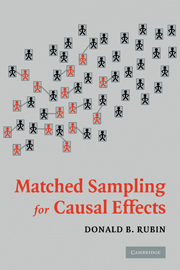Book contents
- Frontmatter
- Contents
- Contributor Acknowledgments
- Matched Sampling for Causal Effects
- My Introduction to Matched Sampling
- PART I THE EARLY YEARS AND THE INFLUENCE OF WILLIAM G. COCHRAN
- 1 William G. Cochran's Contributions to the Design, Analysis, and Evaluation of Observational Studies
- 2 Controlling Bias in Observational Studies: A Review
- PART II UNIVARIATE MATCHING METHODS AND THE DANGERS OF REGRESSION ADJUSTMENT
- PART III BASIC THEORY OF MULTIVARIATE MATCHING
- PART IV FUNDAMENTALS OF PROPENSITY SCORE MATCHING
- PART V AFFINELY INVARIANT MATCHING METHODS WITH ELLIPSOIDALLY SYMMETRIC DISTRIBUTIONS, THEORY AND METHODOLOGY
- PART VI SOME APPLIED CONTRIBUTIONS
- PART VII SOME FOCUSED APPLICATIONS
- Conclusion: Advice to the Investigator
- References
- Author Index
- Subject Index
1 - William G. Cochran's Contributions to the Design, Analysis, and Evaluation of Observational Studies
Published online by Cambridge University Press: 05 June 2012
- Frontmatter
- Contents
- Contributor Acknowledgments
- Matched Sampling for Causal Effects
- My Introduction to Matched Sampling
- PART I THE EARLY YEARS AND THE INFLUENCE OF WILLIAM G. COCHRAN
- 1 William G. Cochran's Contributions to the Design, Analysis, and Evaluation of Observational Studies
- 2 Controlling Bias in Observational Studies: A Review
- PART II UNIVARIATE MATCHING METHODS AND THE DANGERS OF REGRESSION ADJUSTMENT
- PART III BASIC THEORY OF MULTIVARIATE MATCHING
- PART IV FUNDAMENTALS OF PROPENSITY SCORE MATCHING
- PART V AFFINELY INVARIANT MATCHING METHODS WITH ELLIPSOIDALLY SYMMETRIC DISTRIBUTIONS, THEORY AND METHODOLOGY
- PART VI SOME APPLIED CONTRIBUTIONS
- PART VII SOME FOCUSED APPLICATIONS
- Conclusion: Advice to the Investigator
- References
- Author Index
- Subject Index
Summary
INTRODUCTION
William G. Cochran worked on statistically rich and scientifically important problems. Throughout his career he participated in the design, analysis, and evaluation of statistical studies directed at important real world problems. The field of observational studies is a perfect example of a general topic that Cochran helped to define and advance with many contributions. Cochran's work provides an essential foundation for continuing research in this important area of statistics.
An observational study, for purposes here, is a study intended to assess causal effects of treatments where the rule that governs the assignment of treatments to units is at least partially unknown. Thus a randomized experiment on rats for the effect of smoke inhalation on lung cancer is a controlled experiment rather than an observational study, but an analysis of health records for samples of smokers and nonsmokers from the U.S. population is an observational study. The obvious problem created by observational studies is that there may exist systematic differences between the treatment groups besides treatment exposure, and so any observed differences between the groups (e.g., between smokers and nonsmokers) with respect to an outcome variable (e.g., incidence of lung cancer) might be due to confounding variables (e.g., age, genetic susceptibility to cancer) rather than the treatments themselves. Consequently, a primary objective in the design and analysis of observational studies is to control, through sampling and statistical adjustment, the possible biasing effects of those confounding variables that can be measured: a primary objective in the evaluation of observational studies is to speculate about the remaining biasing effects of those confounding variables that cannot be measured.
- Type
- Chapter
- Information
- Matched Sampling for Causal Effects , pp. 7 - 29Publisher: Cambridge University PressPrint publication year: 2006
- 4
- Cited by



